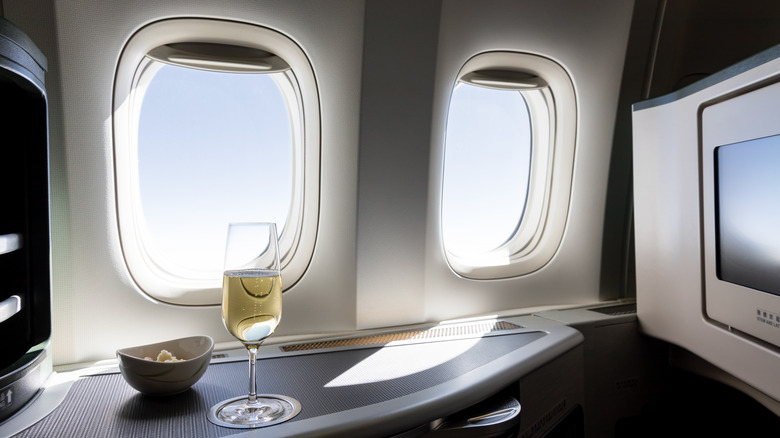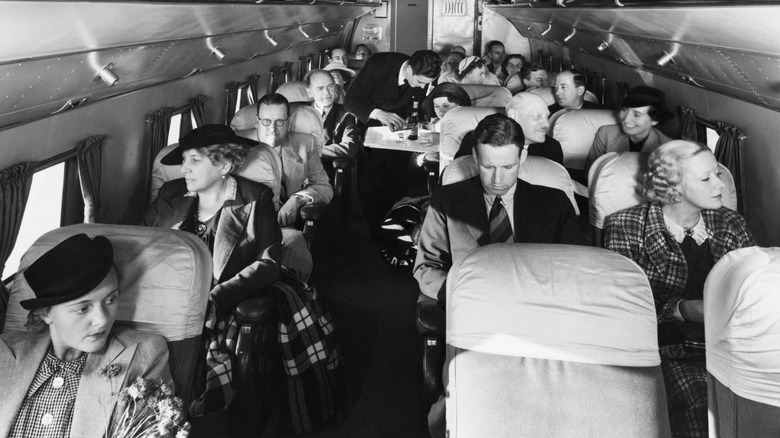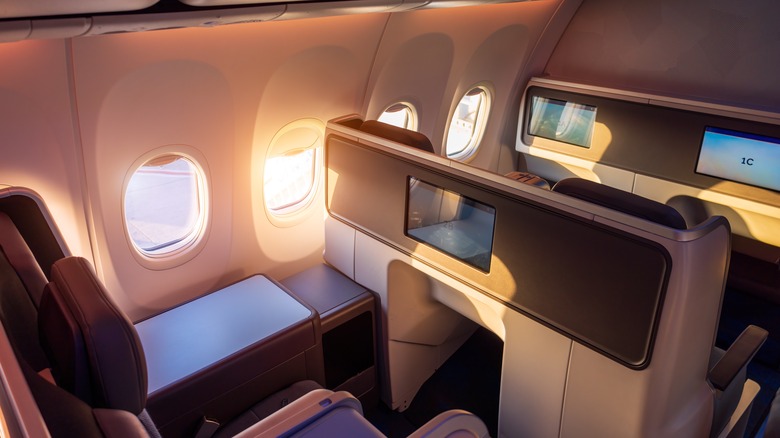One Elite-Status Airline Perk Might Be Coming To An End In 2025
We may receive a commission on purchases made from links.
Award travel or free upgrade? For legions of elite-status airline passengers, that choice was the driving force behind their decision to remain loyal to a specific carrier. Award travel — booking flights using accrued mileage points — certainly had its draws, especially for business travelers flying on their company's dime who, in turn, could redeem the miles for personal travel. On the other hand, there's something appealing about cashing in miles for an upgrade on a long-haul flight. And let's not forget the coveted perk afforded only the highest-tier frequent fliers: the complimentary upgrade. For decades, loyal members of frequent flier programs were afforded perks not available to casual flyers — but there were books about how to get in on the upgrade action. Airlines could count on revenue from repeat bookings by travelers more interested in maintaining status — and access to the associated elite benefits — than chasing the lowest airfare across different airlines.
But recently airlines have been chipping away at elite-status perks. In 2023, three U.S. carriers — American Airlines, Delta Air Lines, and United Airlines — upped the ante on the spending requirements necessary to earn status associated with perks like early boarding and airport lounge access. Airlines claimed the more stringent qualifications were necessary to maintain the value of elite-tier membership for their most loyal customers. As travel bounced back to pre-pandemic levels it became clear that the lingering impact of temporary pandemic-related accommodations — extended mileage expiration and more members earning status via credit card alliances — had increased the ranks of elite fliers beyond the capacity of loyalty program infrastructure. As Delta Air Lines CEO Ed Bastian told CNBC, "If everyone's special, no one feels special." That may have been good news for longtime loyalists, but now airlines are taking aim at the coveted complimentary upgrade — and even the highest-tier fliers may be in for a rude awakening.
The evolution of frequent flier programs
Back at the dawn of commercial air travel, in-flight service was a one-size-fits-all situation. Early passenger planes didn't have separate cabins for high-rollers. The concept of charging more for a premium flight experience didn't enter the picture until after World War II, and even then the difference wasn't all that dramatic. For example, airline seats were the same regardless of class of service until the Douglas Aircraft Company introduced varied cabin configurations in the 1940s. That innovation ushered in the era of multi-tier service, a milestone cemented into place with the TWA's 1955 introduction of premium-cabin seats. Still, snagging a premium-class seat remained a pay-to-play transaction. The idea of a free upgrade to a more comfortable seat with better in-flight service would have been considered ludicrous. Then came airline deregulation in the 1970s. Suddenly, individual carriers were free to let the market drive their pricing structure. Instead of having one fare for coach and one fare for first class, airlines could sell more seats by discounting less desirable seats that may otherwise have stayed empty. So began the evolution of restricted (for example, non-refundable) fares.
By then, first class had become the provenance of the small demographic of passengers who were willing to pay a premium for comfort and flexibility. Still, a huge majority of seats in the premium cabin remained empty. The problem was, most aircraft had more first-class seats than first-class passengers. Then came an ah-ha moment. Let's introduce our most loyal coach customers to the comforts of the first-class cabin — for free. Maybe they will see the light and pony up the extra fare for premium seating going forward. The scheme worked. For a while, the most loyal frequent fliers could almost count on a complimentary upgrade at the boarding gate. Then the bookkeepers took notice.
Are complimentary upgrades doomed?
Once the financial impact of giving away empty seats versus selling them at a discount became clear, the days of complimentary upgrades were numbered. For perspective, as recently as the early 2000s, most passengers seated the premium cabin weren't paying for the experience. They were loyal customers upgraded free of charge as a reward for their allegiance. Fast forward to the mid-2020s and complimentary upgrades are few and far between. More than 70% of first-class seats are paid for and generate income for the airline. The bookkeepers made their point: Selling a would-be empty seat for even a fraction of the full fare instead of giving it away is simply better for the bottom line. The strategy also opens unoccupied premium-cabin seats a larger customer base making it possible for any passenger, regardless of frequent flier membership, to pay a nominal fee to upgrade, in effect hop-scotching right over elite-status passengers hoping for a complimentary upgrade.
In November 2024, Delta Air Lines president Glen Hauenstein revealed some surprising details. During the airline's annual investor presentation, Hauenstein said the decision to sell — rather than bestow — unoccupied premium-class seats had been an unexpected boon for the carrier's finances. Hauenstein told investors that Delta was selling less than 10% of its premium-cabin inventory about 10 years ago. The rest of the seats were awarded as complimentary upgrades to loyal frequent fliers. Today, Delta is selling up to 75% of its premium-class seat inventory. That's good news for the airline, but not so much for high-tier Delta loyalists who had become accustomed to complimentary upgrades. Factor in airline industry contracts that stipulate deadheading pilots get first dibs on premium-cabin seats and there's no way to avoid the very real possibility that complimentary upgrades will be nothing more than a fond memory for fliers sharing tales about the good old days.


